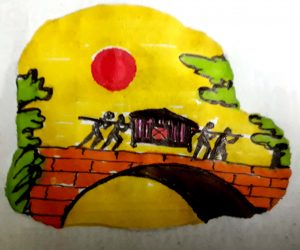FS: Book 1 – Chapter 4
 Anadi Rai went out of his way to ensure his subjects were happy. He planned and strategized methods to keep them healthy, safe, and lively. Every evening he set up in-house concerts for hymns and carols. People from the whole village came to indulge in the bit of recreation that grew.
Anadi Rai went out of his way to ensure his subjects were happy. He planned and strategized methods to keep them healthy, safe, and lively. Every evening he set up in-house concerts for hymns and carols. People from the whole village came to indulge in the bit of recreation that grew.
He organized weekly religious conferences to discuss the Holy Scriptures. The knowledgeable elderly people participated in explaining and imparting Holy thoughts among all in simple language.
A brotherhood had developed among the villagers. They cared for each other and actively helped solve their day to day problems. Twice a year a large fest and fair was organized. Singers and performers from neighboring villages and the city were invited to take up the stage. Preparation for the program lasted about a month before the actual event. A large stage would be set up using bamboo. The stage was open ended on three sides, and the fourth side was covered with large curtains. Behind the curtains was the staircase used by the participants, beyond which was the greenroom. The participants stayed in the village for the next few days while the event was on. The big bungalow in the adjoining garden to Rai’s house served as their guest house. Their food and lodging was taken care of by Anadi himself. The villagers didn’t have any extra expenditure for this, but it was a good way to sell their handiwork in their fair as well as have fun at the event.
The performers had colorful shining dresses on when they went on stage. Songs and dialogues had long chanting tunes that was the specialty of their performances. Different types of folk songs, dances, drama depicting the then lifestyle and religion, and magic tricks were performed. The villagers would sing lines from the songs or quote dialogues from drama even after the event got over. Story-lines were generally based on religious scripts or historic incidents. The programs would start every dusk and continue whole night. The villagers used to carry large lanterns to last them the whole evening.
Besides fests, fairs, events and concerts, the village worshiped a number of gods and goddesses from time to time throughout the year. The beginning of the Bengali New Year marked the initiation of festivals, and they continued for the rest of the year with one or two every month. Since the village was rich in agriculture and plantation, harvest festivals were conducted at the time of grain reaping. The village believed the land was their mother, and worshiped Mother Earth. Winter had introduced the delicacies made from rice, wheat, and other grains. Women followed a number of rituals as a part of the superstitions of the village in order to complete the different festivals.
The village fairs were equally colorful. Mud dolls, toys, cotton clothes from the hand-loom and a variety of home-made snacks and fries were all over the field. The poorer sect used to make and sell these items, whereas the richer played as customers. The potters like to keep a variety of toys, utensils and other household items made of mud. The weavers sold cotton towels and clothes. Chefs prepared sweet and spicy dishes to sell at the fair. The whole village took part in the fair, except the women in the Anadi Rai’s residence. Like other similar women from the well-to-do families, these ladies had a set of restrictions they had to abide by.
The barber’s wife used to come to Anadi Rai’s place every week to tend to the women there. She used to cut their nails, trim their hair, clean and massage their hands and feet, apply vermilion on their foreheads, and paint the soles of their feet with a red liquid called Álta’. The tailor’s wife used to get clean new hand-loom saris for the women, and the cook’s wife brought sweets and taught a thing ir two about baking. The washerwoman came to do the laundry, the peasant’s wife brought milk and other milk prepared products, and the chef’s wife came to cook everyday. The maid came to clean rooms and furniture from time to time. In short Anadi Rai’s household women were treated like royalty within the village.
During festivals, the women rode a horse carriage to the temple to make their offerings to the Lord. When fests were on, performers used to be called at Anadi Rai’s residence in the day time to perform specially for the women there. The women stayed behind curtains to enjoy the performances. They were not allowed to show their faces or interact with these outsiders.
Caste system was widely prevalent in the village, and usually reflected in their occupation and lifestyle. The lower castes had to live separate from the rest of the village in one corner of the village; they included fishermen, carpenters, cobblers, blacksmiths, potters, and cleaners.
Communication from one village to another village included horse carriages, bullock carts and palanquins. Exquisite palanquins served the special purpose of carrying the newly weds from their parental house to their in-laws and vice versa. Palanquins were decorative wooden portable carriages that had long bamboo stems sticking out from the front and back. These were carried by muscular men who specialized in fighting and martial arts, and the carriage could hold a person or two at a time. When the palanquin bearers carried a palanquin, the streets of the village rang with the deep rumble of their voices chanting ‘Hun Hun Na’. They were guarded by more muscular men having thick bamboo sticks, for security purposes. The purpose of these security was to fight robbers and wild animals on the way (just in case).
Robbery was considered a serious profession back then, and in fact more prestigious than thievery. They used to live far from the residential area of the village, and preferred to stick to the thick forest. They were equally brave and strong, and had to deal with wild animals a lot more than the other villagers. They also worshiped a different form of Goddess Kalika, to give them strength with robbery and hunting. The other villagers feared them. Often young men took interest in learning heavy defense mechanisms from a very early age to protect the village from the robbers. Anadi Rai himself arranged and sponsored trainings of fighting and martial arts for these youngsters.
